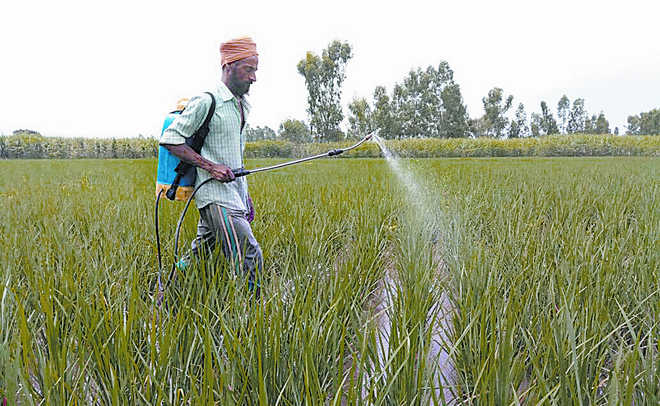
File photo
Jasmine Singh in Chandigarh
Dealers of certain pesticides/insecticides across Punjab are clueless over how to dispose of hundreds of litres of the stock days after the state government banned sale of these hazardous chemicals. The state government’s decision came after the National Human Rights Commission sought a response — a second time since 2011 — from the state as well as the Centre over the reckless use of these chemicals being blamed for subsoil and groundwater contamination by heavy metals resulting in a variety of serious diseases among villagers of the Malwa region.
The Sunday Tribune in its Jan 28 edition cited a test report confirming large presence of these metals in the soil and the ‘resultant’ physical disorders.
A week after the ban, some of the 11,500 licensed dealers say they have no option but to drain the stock in the nearby canals — a step that can cause further damage to the environment. A few other dealers say they may sell the stock to the neighbouring states. State’s director (agriculture) Jasbir Singh Bains says measures are being taken to handle the present situation. “Under the Insecticide Act 1968, we have suspended the pesticides for 60 days. After that we will be sending a report to the Central Insecticide Board that will take a final call on the ban,” he said.
Bains says the state government has informed the department of agriculture and farmers' welfare that the sale of insecticides/pesticides mentioned in a schedule may be suspended for two months. The government has acted on the recommendations of the Registration Committee, Punjab Agriculture University and the Punjab State Farmers Commission.
While the ban brings in huge monetary loss for the dealers and distributors, farmers will hopefully not bear the brunt of the situation. “They are free to buy the banned pesticides from elsewhere, if they want to. They are also free to use the existing stock. We can only issue an advisory informing them not to use the banned insecticides and how they are harmful for their health and for the environment. Yet we cannot stop them from using it,” says Bains. But this does not seem to address the problem of the dealers. They can either sell the stock outside or return it to the company. “They wouldn't be allowed to sell it in Punjab. If they are found to be doing so, we will cancel their licence,” warns Bains.
Sunil Mundra of Periwal Pesticides Abohar has yet to get in touch with the company from where he bought the stock. “It is a loss for us. If the company doesn’t agree to take the stock back, we'll have to keep it in the godown.”
Another dealer from Abohar, Om Prakash Dhamija of Zamidara Pesticides says he may get billing for another product in lieu of the sold stock. “Not all companies have a return policy. In that case, we have to sell it in others states.” Even though dealers across Punjab have threatened to drain the banned chemicals in canals, Bains does not see this coming. “It is illegal to dispose of insecticides/pesticides like this. So, I don't think they would so something like this as it is punishable under law.”
The Insecticide Act lays down a disposal procedure: After segregation of the expired pesticides, such stocks must be stamped ‘not for sale’, ‘not for use’ or ‘not for manufacture’. “All such stocks then shall be disposed of in an environment-friendly manner as may be specified by the Central government in consultation with the Central Insecticide Board.” Though it will take some time to wipe out the banned chemicals from the market, farmers still have alternatives readily available in the market.
Pritpal Singh from Baba Farid Centre for Special Children, Faridkot, says the extra stock should be collected from distribution centres and disposed of in a scientific way. The current scenario does not hold out a guarantee that the ban will help in reducing the toxicity levels in the soil. The solution probably lies in formulation of a new policy/law, which according to Bains, is still in a preliminary discussion stage.



























